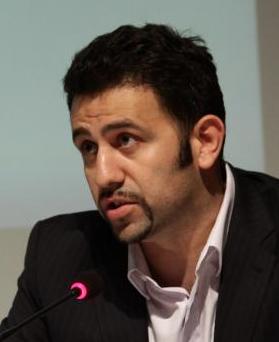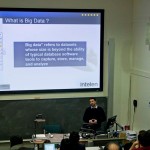My research started back in 2001, when during my studies I worked at Imperial College on model reduction techniques (following my Engineering Thesis work @ Dundee on flexible robotics and control), using advanced numerical linear algebra and topoology (Lanczos and Arnoldi approach on Krylov subspaces) in order to reduce the complexity of a complex system, using the eigenvalue theory.
I continued my work at Ecole polytechnique in Paris (Ingenieur), where my work focused on the application of differential mathematical topology (isomorphic hypercube and various permutations) for asychronous data mining on a distributed set of processors. I then realized that I could use the theory and the mathematical algos created to solve real data analytics problems, in a distributed way, faster and more efficient (2006). My first draft paper on the hypercubic approach can be found here
My work during my PhD focused on the application and evolution of my previous work, applied on the learning management systems (e-learning) and later on the energy information systems (smart grids); as an outcome, I created Intelen (from Intelligent Energy) as a research group. My approach can be also applied to engagement analytics and ways of correlate machine/sensor KPIs with behavioral KPIs in order to define, measure, assess, quantify and predict engagement of humans/users with digital means and products (Marketing, Banking, Energy, Health, Sales, Ads, etc)
One of my PhD exit papers, successfully worked as the foundations of my first startup (Intelen Inc) and can be found here. In this paper I created a new recursive permutation of K-means (here), the RKM clustering (here), based on the hypercubic topology and distributed computing, following some stochastic distributions for routing. I could analyse tones of clustered information in real-time and observe how the information was related with various dynamic KPIs. I will apply this approach to Health analytics, Smartcities, IoT and Sensor grids, over mobile apps. Also this algo can be applied to engagement analytics, in order to analyse and visualize human engagement metrics to a digital channel, during the whole engagement procedure.
Many papers and details of my applied research on data and energy analytics, IoT and behavioral science, can be found here and here
Current Research topics/focus:
- Analytics and Data Science/Data Architecture
- Engagement Analytics, drop outs, engagement predictions
- Behavioral Science and gamification
- IoT and Sensor Grids
- Energy Analytics and Smart Grids
- Medical Analytics and patient engagement
- Engagement analytics/persuasion and data-driven strategy
- SmartCities and Data Portals
- Proximity analytics and the Theory of Dark Data
 v.n.
v.n.